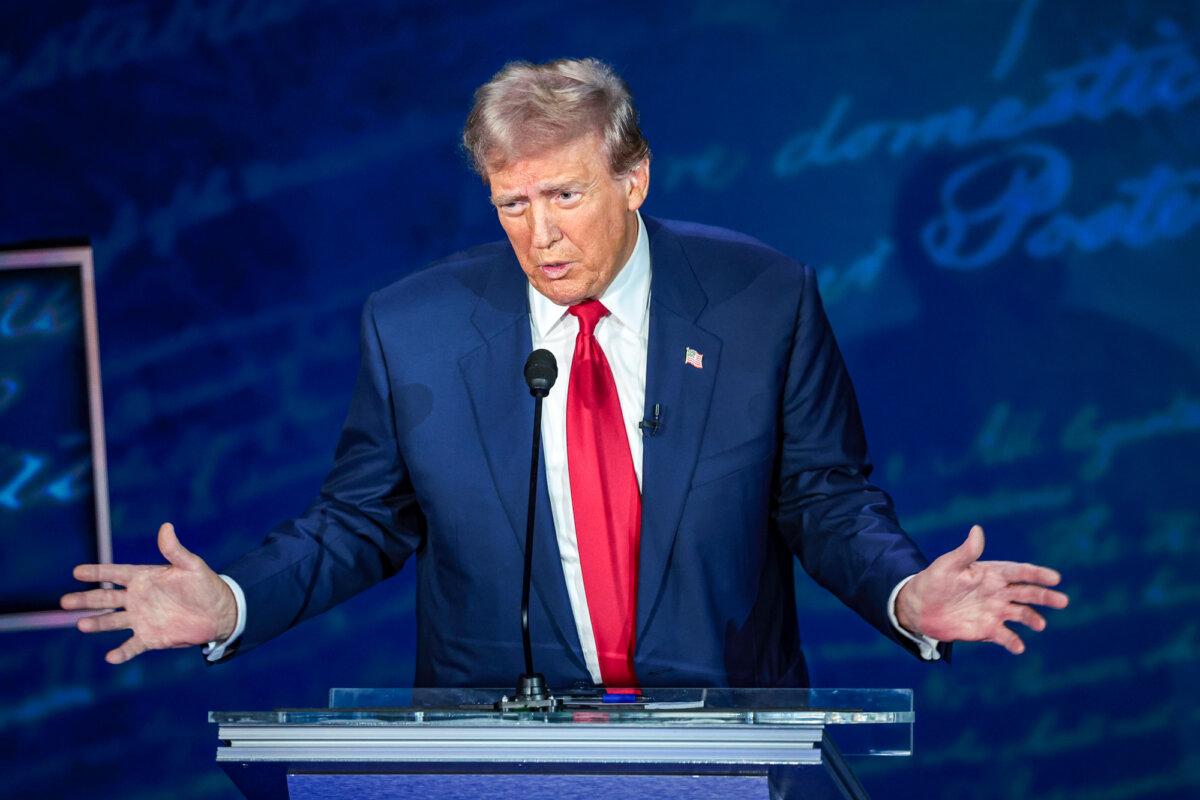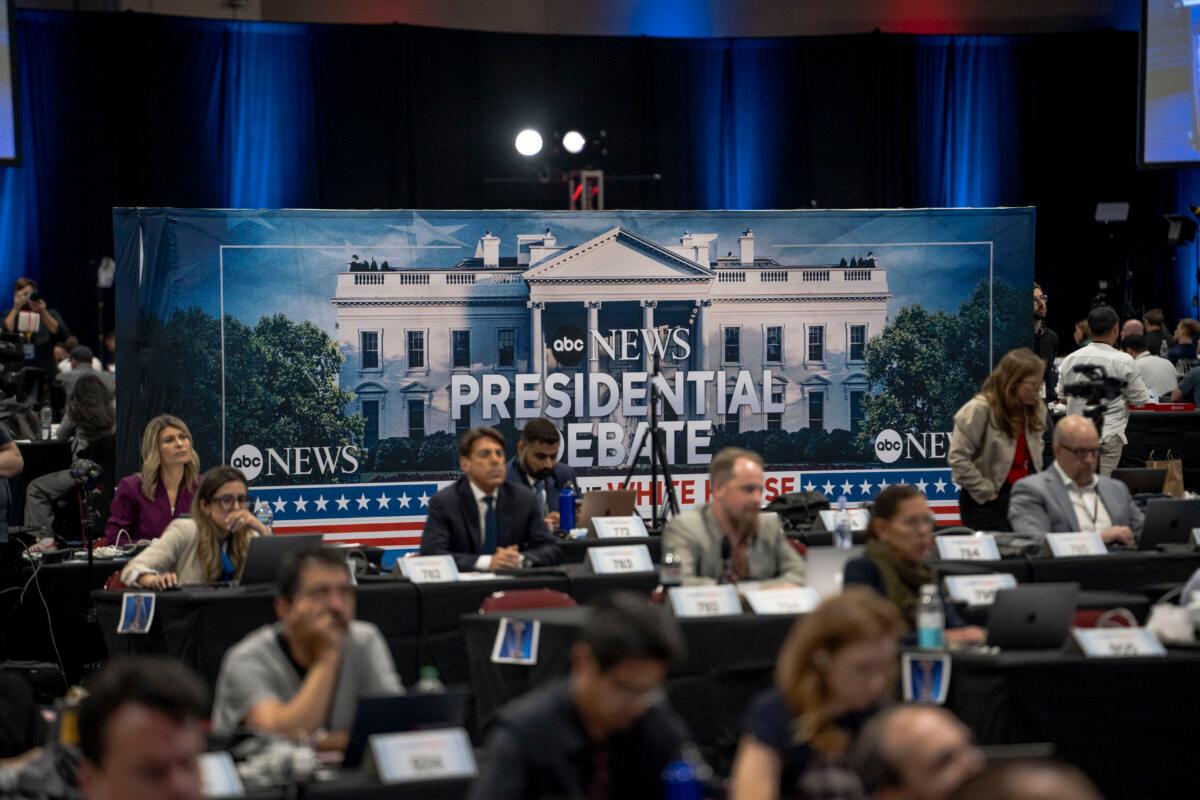The debate was Harris’s first since 2020, and Trump’s first since the June showdown that prompted Biden’s exit from the presidential race.
The primary candidates for the nation’s highest office offered little clarity on their policy plans as they met for the first time for a live, televised debate in Philadelphia on Sept. 10.
In an opening exchange on the economy representative of the rest of the debate, Vice President Kamala Harris and former President Donald Trump offered no additional details on their plans, misrepresented each other’s positions, and traded attacks on topics including Jan. 6, the pandemic, and the crisis on the U.S. southern border.
Although Harris reiterated a handful of policies she has recently introduced and pitched her vision for an “opportunity economy,” outlining her platform was not at the top of her agenda. Instead, Harris devoted significant time to introducing herself to the public in personal terms, talking about her record as a prosecutor, lawmaker, and vice president and describing her middle-class upbringing.
Trump also spoke less about his policy proposals, using the debate to define Harris as a far-left liberal and tie her to President Joe Biden and his administration’s crises, including inflation, the border, and the withdrawal from Afghanistan. In at least two exchanges and in his closing statement, the former president asked Harris why she hadn’t already accomplished the things she now proposes during her nearly four years as vice president.
Ahead of the debate, questions remained about both candidates’ stances on abortion. The former president twice avoided answering whether he would veto a national abortion ban. Harris, likewise, did not respond when Trump asked if she would allow abortions in the seventh, eighth, and ninth months of pregnancy.
“I thought that there was very little substantive policy discussion,” Matthew Wilson, a professor of political science at Southern Methodist University, told The Epoch Times. “I think that is unfortunate for voters.”
Despite the lack of detail, a few colorful moments offered relief for viewers and insight into the candidates.
Throughout the debate, Trump looked at the moderators and the camera rather than facing Harris. The vice president, meanwhile, often faced Trump directly. When the two candidates first took the stage, Trump walked slowly toward his podium instead of to the middle of the stage. Harris ended up by his podium by the time the two shook hands. Harris said her name. Trump said, “Nice to see you. Have fun.”
Ian Sams, a spokesperson for Harris’s campaign, indicated that the gesture was meant to remind Trump not to mispronounce her name.
“I think she wanted to go, show command, and introduce herself, including how to say her name,” Sams said.
Unlike Harris’s debate against Vice President Mike Pence in 2020, she was twice on the receiving end of a put-down as Trump wouldn’t let her interrupt his remarks.

Former President Donald Trump speaks during a presidential debate with Vice President Kamala Harris at the National Constitution Center in Philadelphia on Sept. 10, 2024. Win McNamee/Getty Images
“Wait a minute, I’m talking now, if you don’t mind, please. Does that sound familiar?” Trump said, apparently referring to Harris making a similar statement to Pence.
Harris told the television audience to attend a Trump rally and witness for themselves what she called “a really interesting thing to watch.”
“You will see during the course of his rallies, he talks about fictional characters like Hannibal Lecter, windmills cause cancer,” Harris said. “And what you will also notice is that people start leaving his rallies early out of exhaustion and boredom.”
In his response, Trump, more animated than in previous rounds, switched to a monologue reminiscent of one of his rallies.
“We have the biggest rallies, the most incredible rallies in the history of politics,” Trump said. “That’s because people want to take their country back. Our country is being lost.”
Aaron Dusso, a professor of political science at Indiana University, called that the most memorable moment of the evening. “It was so clearly an attempt to bait him into talking about [crowd size], and he took the bait,” Dusso told The Epoch Times.
While criticizing Trump’s actions following the 2020 election, Harris said, “We’re not going back. It’s time to turn the page.”

Democratic presidential nominee, Vice President Kamala Harris, debates Republican presidential nominee, former U.S. president Donald Trump, at The National Constitution Center in Philadelphia on Sept. 10, 2024. Win McNamee/Getty Images
The former president tried to define Harris by Biden’s policies, effectively identifying them as one and the same in political terms. “Remember this, she is Biden,” Trump said.
Trump said Harris must be held responsible for the inflation of the last three years. “She can’t get away with that.”
Pointing to incidents of violent crime by illegal immigrants, Trump said, “These are the people that she and Biden let into our country, and they’re destroying our country.”
Trump’s closing identification of Harris with the Biden legacy provided perhaps his strongest moment in the debate.
“She just started by saying she’s going to do this, she’s going to do that, she’s going to do all these wonderful things. Why hasn’t she done it?” Trump asked.
“She’s been there for three and a half years. They’ve had three and a half years to fix the border. They’ve had three and a half years to create jobs and all the things we talked about. Why hasn’t she done it?”
Each time Trump pinned the Biden legacy on Harris, she countered by distancing herself from the president.
“You’re not running against Joe Biden. You’re running against me,” Harris said. And, later, “Clearly, I am not Joe Biden. And I am certainly not Donald Trump.”
“What I do offer is new leadership for our country, one who believes in what is possible, one who brings a sense of optimism about what we can do,” Harris said. She then recounted her plan to give a $50,000 tax credit to business startups, a $6,000 credit for families with newborn children, and a $25,000 to first-time home buyers for their down payment.
Holding Biden at arm’s length appears to be a campaign strategy, given Biden’s low approval ratings and poor performance against Trump in the polls prior to leaving the race.
California Gov. Gavin Newsom told reporters before the debate, “She’s got to show the American people tonight that she’s not Joe Biden.”
Harris, facing the reality of running an abbreviated campaign after Biden’s exit from the race, released a handful of policy proposals on her website the day before the faceoff. She has so far conducted one television interview, a significant portion of which was spent defending her shifting positions.
The debate did little to clarify her stance on policy.

Members of the press watch the presidential debate between Republican nominee former President Donald J. Trump and Democratic nominee Vice President Kamala Harris in Philadelphia, Pa., on Sept. 10, 2024. Madalina Vasiliu/The Epoch Times
“I think the problem with the way the media has conducted this post-Harris version of the campaign is really to focus away from policy as much as possible,” former Republican presidential candidate Vivek Ramaswamy told The Epoch Times.
Harris instead introduced herself to the American public and, for the first time, to Trump. The debate marked their first encounter.
Harris recounted her middle class upbringing and its influence on her platform, which she described as a plan to lift up the middle class and working people.
“As a prosecutor, I never asked a victim or a witness, ‘Are you a Republican or a Democrat?’ The only thing I ever asked them [was], ‘Are you okay?’ And that’s the kind of president we need right now,” Harris said.
She contrasted herself with Trump, reminding the audience of his criminal conviction in Manhattan earlier this year on 34 felony counts.
Trump responded with his belief that all charges against him were due to Biden’s weaponization of the Justice Department.
The debate was also thin on foreign policy. Harris accused Trump of cozying up to totalitarian dictators like Russian President Vladimir Putin and North Korean Supreme Leader Kim Jong Un. Trump suggested that neither Russia nor Hamas would have invaded Ukraine and Israel, respectively, had he been in office.

A presidential debate watch party at the Ulysses bar on Stone Street in Manhattan on Sept. 10, 2024 Courtesy of Juliette Fairley
When asked if he wanted Ukraine to prevail against Russia, Trump said he wanted the war with its senseless killing to end. He laid responsibility for the war on Biden, saying that his handling of the U.S. withdrawal from Afghanistan, which Harris defended, emboldened international aggressors. Both candidates reiterated their support for Israel.
While it initially appeared like Tuesday’s debate may be the last, both candidates’ camps signaled a possible rematch.
“Under the bright lights, the American people got to see the choice they will face this fall at the ballot box: between moving forward with Kamala Harris or going backward with Trump. That’s what they saw tonight and what they should see at a second debate in October,” said Harris campaign chair Jen O’Malley Dillon.
Former Republican presidential candidate Vivek Ramaswamy said, “I think more debates are good and good for the people of this country.”
Speaking from the spin room after the event, Trump said he would consider a second debate.
Jan Jekielek contributed to this report.
Original News Source Link – Epoch Times
Running For Office? Conservative Campaign Consulting – Election Day Strategies!


